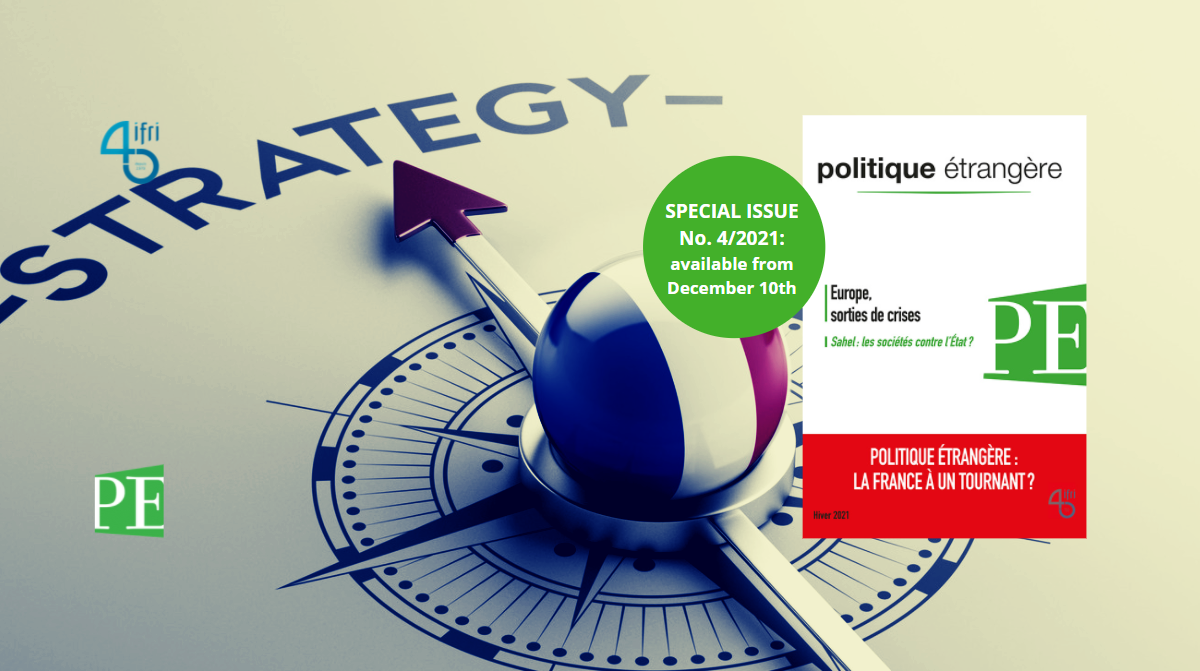Foreign Policy: France at a Turning Point?
An exceptional issue of Politique étrangère
Confronted with a world in which the fundamentals are being redefined, France’s foreign policy is under scrutiny. In which geographies should France assert its presence? To which major challenges should France be responding in order to survive in tomorrow’s world? What kind of relationship to that world should France be establishing, as thirty years of Western intervention have ended in catastrophic failure in Afghanistan?

The European option is a priority for all French foreign policy thinking. But which Europe? Will the legacy of the Covid-19 crisis be a “federalized” Union, or will the crisis confirm the resilience of national egotisms? Is the European Union determined to provide itself with the resources—financial in particular—needed to make its digital and environmental transition a success? And will it finally decide to assert itself in the interests of its own security?
In the Sahel, have France and its European partners grasped the scale of the local and regional problems they face? Is it possible to declare that there is a need for a return of state authority without an in-depth study of the legacy of colonial history, the diversity of societies, and the specificities of populations’ political cultures?
Two current affairs investigations confirm the breadth of the challenges facing foreign policy. Will the Taliban be able to govern an Afghanistan weakened by economic and food crises, the growing threat of terrorism, and ostracism from the international community? And what about Poland? What are the long-term prospects of a regime that is on the receiving end of criticism from Brussels but that is also responsible for defending the Union’s borders?
This issue is available in French only.
The Direction of France’s Foreign Policy over the Next Thirty Years, by Thierry de Montbrial (in French only - La politique étrangère de la France: un cap pour les trente prochaines années)
Preparing for 2050: From “Foresight” to “Grand Strategy”, by Martin Briens and Thomas Gomart (in French only - Comment préparer 2050 ? De la « prévoyance » à la « grande stratégie »)
Game Over: Western Military Interventionism, 1991–2021, by Louis Gautier
EUROPE, CRISIS RECOVERY
Covid-19 and Other Crises: What Lessons Should be Drawn?, by Jim Cloos
After Brexit and Covid, What is the Future for Europe?, by Federico Fabbrini
The European Union, Between Fragmentation and Consolidation, by Maxime Lefebvre
European Economic Governance: Past Errors and Future Promises, by Vivien Schmidt (read the article)
European Defense: Acting in Time, by Claude-France Arnould
SAHEL: SOCIETIES AGAINST THE STATE?
Introduction: Waiting for the Return of the State
What Does Mali’s Political Future Look Like?, by Monique Chemillier-Gendreau
Pastoral Societies and the State in Mali: The History of a Hiatus, by Charles Grémont
Mali: The Obstacles to Security Sector Reform, by Marc-André Boisvert
Islam and Politics in the Sahel, by Ibrahim Yahaya Ibrahim
Gold Rush: A Challenge to the Stability of Saharan States, by Laurent Gagnol and Rhoumour Ahmet Tchilouta
CURRENT AFFAIRS
By the Grace of Allah: The Taliban and the Challenges of Government, by Jean-Luc Racine
Poland: Is the Slippery Slope Toward Autocracy Reversible?, by Georges Mink
BOOK REVIEWS
Le premier XXIe siècle. De la globalisation à l'émiettement du monde (The First Twenty-First Century: From Globalization to World Disintegration), by Jean-Marie Guéhenno
By Pierre Buhler
Download the full analysis
This page contains only a summary of our work. If you would like to have access to all the information from our research on the subject, you can download the full version in PDF format.
Foreign Policy: France at a Turning Point?






